- Home
- William Kennedy
The Last Mission Page 3
The Last Mission Read online
Page 3
“Get the release count, Campbell,” Colonel Mast shouted through the intercom. “Shut up and get the goddamn release count!” His voice was like a slap. Campbell’s screaming stopped instantly, followed by the sound of his gasping for breath. “Get on the release!” the colonel shouted again.
“I’m on it, Colonel. I’m okay.”
We were the right corner plane in the last box, above and behind the formation, where the colonel could see the whole group spread out in front of him like the models on the plotting table. He flicked the switch on the wheel column, cutting from the intercom to the squadron frequency. “Keep it tight, goddamn it!” he ordered all pilots. “Barbella! Close it up!”
Captain Barbella’s plane eased into the space where Jim Falcone’s “Italian Stallion” had been. The Stallion rolled out of position, trailing smoke from its number-three engine. Then an explosion blew the wing off and it fell through the squadron, flipping like a coin. The other wing had broken free and cut into Lee Garrison’s plane. The two wrecks had dropped out together.
“Reidy! Close up on Barbella!” Colonel Mast was snapping commands as if they were on a parade ground, ignoring the war raging before him. The German 190s were diving through the bombers at will, free to pick their angles of attack while the bombers were holding course and speed. They’d veer toward one of the B-17s and shoot pieces off its wings and tail. Glass turrets would shatter and engines suddenly burst into flames. The American gunners could fire back while the Germans were approaching, but they had to hold their fire once an attacker entered the formation for fear of hitting their own planes. The German fighter pilots had no such worry.
Another B-17 Flying Fortress fell into a dive, its pilot trying to keep her on a constant angle so the others could avoid colliding with him. The formation opened as the plane dove to earth, white parachutes suddenly puffing out behind her.
“Close it up, Wilbur,” Mast ordered. “You too, Franklin.”
I had my head down, pretending to be busy with the instruments, too afraid to look up to see where the next wave of fighters was forming, too sick to look ahead to where the navigator’s blood was clotting on the Plexiglas dome.
“Bombs away!” The bombardier in the group’s lead plane had locked on the target, and the Norden sight had calculated the point of release.
“Mark thirty seconds,” Campbell said. He had somehow regained his sanity, despite the hole in the deck behind him and Patten’s bloody form crushed into the map table. Our bombs would drop in thirty seconds, exactly when we reached the point where the lead plane had dropped. “Precision bombing,” they called it—all the bombs obliterating a tightly defined target. Just as often it meant all the bombs missing, turning a farm patch into a ditch while a power plant a few hundred feet away kept right on operating.
“Bogie! Bogie!” Tim Bradley screamed into the intercom. The flight engineer was up in the turret directly behind the flight deck, so close I could hear him without the earphones. “Six o’clock. High.”
Denny Ring’s voice screamed from the dorsal turret in the glazed roof of the radio space. “I see him! I got him!” I glanced across at Colonel Mast, hoping he wasn’t staring at my fear. He was still positioning his squadron tight up against the other planes in the group, seemingly unconcerned that a 109 was diving down on top of us, with its automatic cannons poised to fire.
“Twenty seconds,” Campbell’s voice monotoned.
The turret gun crackled behind me as Bradley began firing. “I’m on you, you Kraut bastard. I’m on you.” Bradley seemed to think he could talk the German fighter into exploding.
“I got him!” Ring screamed, and then his gun began firing, adding another dimension to the deafening confusion. Guns were chattering furiously, spent cartridge cases clanking against the metal floors, and machine-gun rounds punching holes through the plating. It was like being inside a tin can filled with marbles that was being shaken furiously by an angry giant. There was the engine’s roar and the sound of vibration as the engines shook the frame like a tuning fork. And then the din of the radios, with voices screaming simultaneously on different frequencies…
“There!”
“Where?”
“Ten o’clock, dammit, ten o’clock.”
“We’re hit. Jesus we’re on fire.”
“Move up, Conners! Fill the damn space. Close it up!”
“A 109. Right on top of you, Red. Christ, aim up, Red! Don’t let him sit on you.”
Suddenly our plane shook, jumping as if we had rolled across a giant pothole. A voice screamed on the intercom. “Christ,” Bradley exhaled. And then he screamed, “You son of a bitch!” A fighter’s form shot past our wing, too fast for me to make out any details. I slammed my eyes shut and was instantly aware that the whole flight deck seemed to be rattling. I looked wide-eyed at the steering yoke shaking in Colonel Mast’s hands as if it was trying to tear his arms off.
“All stations,” Mast announced calmly, switching back to the intercom, “report control surfaces.”
“We’re hit,” came a response from one of the gunners. “The radio space…”
Bradley’s voice shouted from behind me. “He got Denny. Put a cannon round right through the dorsal turret.”
“Report control surfaces,” Mast repeated, with ice in his voice.
“Fin and stabilizer okay, Colonel?”
“We’re hit, Colonel,” one of the waist gunners cried.
“I know we’re hit, damn it!” Mast snapped. “Now report control surfaces.”
Bradley cut in. “It’s your left aileron, Colonel. It’s flapping in the breeze. Looks like everything is shot away except the control link.”
The yoke was still tearing furiously at Mast’s grip. The wheel in front of my copilot’s position was shuddering. Instinctively, I grabbed it and tried to hold it steady.
“Ten…nine…eight…” Campbell began counting down.
Colonel Mast shot me a glance. “Hold her steady.” Our combined grip seemed to have taken some of the wobble out of the damaged aileron. We were still in position, tight up against the lead plane in our box.
Campbell was still counting down until he yelled “Bombs away!”
The plane jerked upward, relieved to be free of the eight five-hundred-pound bombs. Strings of bombs fell simultaneously from the fourteen B-17s that were left in our group. After a few moments they disappeared into the smoke that was curling up from the target.
The wheel yoke stopped shaking. I glanced at Mast. “It must have torn off,” he explained, his eyes locked back on the squadron, and then Bradley’s voice confirmed, “We lost the aileron, Colonel. And I think a piece of the flap.”
“Check the damage, Marron.” Mast was still looking straight ahead. “Are we pulling out to find jumping room? Or are we sticking with the squadron?”
I was beyond fright. The plane was breaking up. One way or the other, I’d be falling through the air. There was no safety in my position on the flight deck. I snapped open the seat harness and pulled the parachute up from under my butt. I squeezed around the turret stand that was whirring back and forth as Bradley panned for other fighters, then I was looking through the open bottom of the plane, thirty thousand feet down to hot fires that were billowing smoke.
The bomb-bay doors were hanging open, the hydraulics shot apart, probably by the same blast that had cut through the navigator’s space. The flooring under the flight deck was gone, the exposed frames holding the nose onto the rest of the body. By hanging onto the turret mount, I was able to lean down into the opening and look forward. Campbell’s knees were set on a small piece of flooring that was still attached behind the glass nose. He could bail out simply by letting himself fall backward, and that seemed his best chance. There was no way the nose framing could hang together much longer.
I closed my eyes as I stood up so I wouldn’t even accidentally look down into the open space, then I stared straight back along the bomb-bay catwalk. I pulled the chute tight and b
it the ripcord between my teeth. With both hands locked on the safety lines, I started aft, passing between the chains and toggles that had held the bombs and now were flapping loosely. I wasn’t afraid of falling; I was afraid of seeing where I would be falling. It was only a few steps, and then I was leaning against the radio room door.
It was jammed. I leaned on it and pushed until it slowly began to give way. I saw the booted leg that was caught under the door edge, and then saw the streaks of blood I was painting as I slid the body ahead of the door.
The cannon round had come through the glazed top of the radio compartment and blown up at Denny Ring’s feet. His body was being held together by his flying suit while his life drained through the holes in his back. The concussion had blown pieces of the radio space into the hiking rig for the ball turret in the belly. One of the waist gunners was on all fours, trying to turn the turret so he could open the hatch. The other was standing like a statue, both hands locked on the handles of his fifty-caliber machine gun, his eyes unblinking. He was watching Denny Ring’s body deflate, as if air was escaping from an inner tube.
I grabbed the kneeling gunner’s intercom. “Colonel, we’ve got our belly gunner caught in the ball. It’s a mess back here.”
“I can hold it a little longer,” Mast answered.
There was no reason for him to say more. He had made it clear that no one was going anywhere without the gunner.
The belly gun on the Fortress was a glass ball hanging on gimbals that were suspended from a tripod of steel tubes. The tubes had been bent so that the gimbals were out of position. There was no way we could raise the ball back into the plane so the gunner could climb out.
He was looking up through the glass panel that should have been looking back toward the tail, his guns jammed against the belly of the plane. His eyes were wild, frightened. He knew the turret wasn’t responding to his control, so he couldn’t get the entry hatch aligned with the opening. He could see the tangle above him, and probably understood that we couldn’t haul him up. Rolled up in a tiny ball, his knees nearly touching his shoulders, he had neither the leverage nor the mobility he needed to help himself. Just by tipping his head back he could see the open bomb-bay doors and the gaping hole under the nose.
“Give me a hammer…a wrench…anything heavy.”
The gunner crawled back to his mount and pushed a canvas bag of tools across the floor toward me. I took out a hammer and tested its weight.
“You’ll never straighten them things,” he said, pointing toward the tripod.
“No time,” I answered. “We’ve got to get him out now.”
I could feel the plane go into a gentle bank. The group had finished the bomb run and was turning back, a time-consuming process, since all the planes had to hold formation throughout the turn. Mast was sticking with the group, gambling that his plane would hold together.
Somehow the belly gunner’s terror replaced my own. I was no longer conscious of the gaping holes and the shot-up wing. I wasn’t even concerned about the river of blood that was running down from the radio area across my knees. Getting the gunner out of his glass coffin was all that mattered.
I waved the hammer in the air, mimicking blows to the upturned glass. The gunner nodded. Then I pantomimed lowering goggles over my eyes and folding my arms over my face. He understood.
I began smashing against the glass, which cracked and starred, but wouldn’t break. I pounded on the thin metal framing that held the glass in place and gave the ball its strength.
The gunner watched as if I’d gone mad. “Christ, Lieutenant, you’ll knock the damn thing loose!”
I kept pounding, my fury fired by the frustration.
“Lieutenant, he ain’t gonna fit through one of them window panes.”
“You got a better idea, Sergeant? Because this thing is going down any minute, and he’s not going to get himself out.”
He looked blankly at me for a second, then he went back to his gun mount, freed the cartridge belt, and lifted the huge fifty-caliber off its mount. I backed away while he raised the butt end of the gun over the turret, and then plunged it straight down. The glass I had been pounding shattered and fell into the ball. He raised the machine gun again and blasted out another pane.
I took chain cutters out of the tool bag and began cutting at the metal framing. It was like cutting wood with scissors: impossibly slow. The sergeant watched me while I kept repositioning the jaws. “Move back, Lieutenant.” He smashed the gun butt against the metal and it broke free.
We repeated the operation on another section of framing, and then another.
“Okay, that’ll do it, Sergeant. Now get in here with me.”
“I’ll hold onto you.” It was the waist gunner who had gone catatonic at the sight of Ring’s butchered body. He had managed to drop his grip on the gun handles and was hovering over us.
“Good idea,” the sergeant said. “Get Max to hold onto the lieutenant.” Max turned out to be the tail gunner.
The sergeant and I leaned down through the hole, each of us reaching one arm into the shattered turret. The ball gunner, who was covered with broken shards, reached up toward us. Our hands locked, giving him the leverage he needed to pull his back off the hatch door and get some of his weight onto his knees.
We shifted our hold to the collar of his flight jacket and were able to lift his head out of the turret. The higher we lifted him, the more leverage he got on his knee pads. His shoulders were in the hole, but were too broad to fit between the intact frames. No matter how he twisted and pushed, he was caught behind the bars of a jail cell.
“Bust those bars!” I shouted to Max.
The tail gunner let go of me, stood up and raised the machine gun. Then he paused, the barrel held in both hands above his head, the butt poised like a battering ram.
“He’s too close,” Max shouted. “I’ll hit him.”
“Smash the goddamned framing,” I yelled back.
“I’ll break his shoulders.”
“Smash the framing. Now!”
The gun butt hesitated over my head, then it plunged down past my face and drove into the framing. The metal split open. The gunner’s collarbone snapped like a twig. His face contorted in a scream that I could hardly hear because of the wind stream, but still, I felt the pain.
He shook with agony as the sergeant and I dragged him up out of the turret. His scream became deafening when we pulled him into the plane and stretched him out on the deck.
I stood, looking everywhere but at his face. “Get a chute on him,” I told Max. “When we jump, someone has to hold him and pull his cord.”
“He needs morphine,” the other gunner said.
“No! Get him on his feet and keep him alert. He’s going to have to jump.”
I turned abruptly, not sure of my decision, but certain that I didn’t want to argue it. Then I started forward, my boots slipping in the lake of blood as I stepped over Ring. I never looked down at him.
This time I didn’t put the ripcord in my teeth. I crossed the bomb bay in three strides, holding tight to the rails so I wouldn’t be blown off the catwalk. I grabbed onto the turret stand and pulled myself around Bradley, who was still panning the sky, looking for fighters.
“Is Ring dead?” He never stopped searching. His eyes never left the sky.
“Yeah.” It sounded insensitive, so I added, “Quick. Never knew what hit him.”
Bradley nodded, still searching for fighters.
“The ball gunner is out,” I told Colonel Mast as I took a new handhold on the back of my seat, “but he’s in bad shape for jumping.”
“We’re doing okay,” he answered. “We’ll stay with her a little longer.”
I knew the plane couldn’t hold together. Christ, I had seen the open frames and the dangling electric wires, but at that instant I just didn’t give a damn. Jump. Stay with it. What does it matter? I was numb. What happens…happens. I squeezed around the throttles and slipped into my seat.
/> We were still in formation, behind and on top of our squadron, which was behind and above the rest of the bomber group. All of the planes were leaving white streaks behind their engines, half-mile-long contrails of ice crystals that shone like Christmas tinsel in the sun. The sky was clear, with puffy white clouds below us. Between the clouds we could see the colorful patch quilt of farm country.
The sky had turned beautiful. There was no smoke, no machine gun fire, no frantic voices screaming over radios, no planes breaking up and spilling their crewmen like gnats into the air. The German fighters had gone back to their bases. The flak gunners were standing down. In the target area, men like me were probably pulling men like the gunner out of tangled steel and from beneath broken concrete, but all that mattered was that we were going back to base.
“Bogies, bogies comin’ up ahead.” It was a gunner in the lead squadron. German fighters from another airfield were coming up to take their turn at us. I glanced at Colonel Mast. He didn’t seem to give a damn.
Our radio picked up the lead plane gunners, shouting warnings to one another. “He’s right under you, Zack. Right under you!”
“I’m on him!”
“Two more dead ahead!”
Voices were drowned out by the chatter of machine guns as the gunners left their microphones open. We could even pick up the whine of the fighters’ engines as they zoomed close by.
“Tommy! Tommy! Tommy’s hit.”
“Kraut bastard!”
The fighters liked to pass straight through the formation, meeting wave after wave of bombers head-on. Low on the nose was the B-17’s most vulnerable angle, and cannon rounds fired through the glass nose would go deep into the guts of the plane before they exploded. If you planned to take a Fortress down with one shot, that was your best point of attack.
There was a white flash up ahead and then a red fireball. Someone in the squadron up ahead had been vaporized by the fumes in his own fuel tanks. Another Fortress peeled away from the edge of the squadron, its white contrails now lost in the trail of dark smoke. Once again, the fear began choking me. We should have jumped, I thought. Nothing could be as bad as burning.

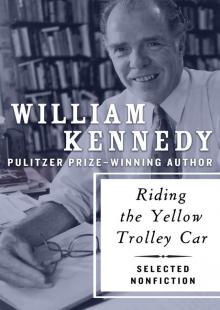 Riding the Yellow Trolley Car: Selected Nonfiction
Riding the Yellow Trolley Car: Selected Nonfiction Changó's Beads and Two-Tone Shoes
Changó's Beads and Two-Tone Shoes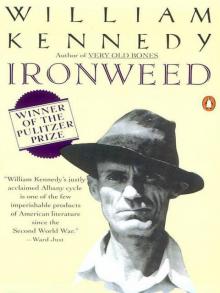 Ironweed
Ironweed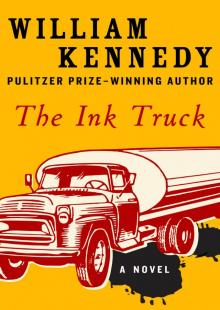 The Ink Truck
The Ink Truck Billy Phelan's Greatest Game
Billy Phelan's Greatest Game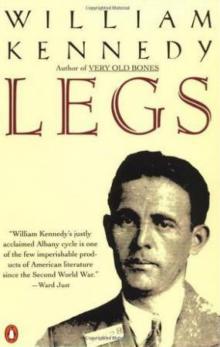 Legs
Legs Very Old Bones
Very Old Bones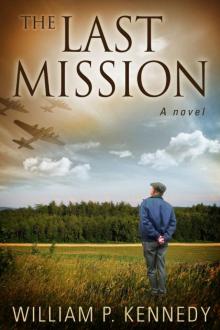 The Last Mission
The Last Mission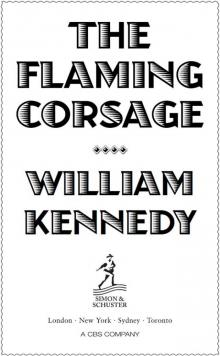 The Flaming Corsage
The Flaming Corsage Roscoe
Roscoe Quinn's Book
Quinn's Book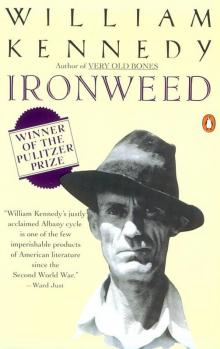 Ironweed (1984 Pulitzer Prize)
Ironweed (1984 Pulitzer Prize)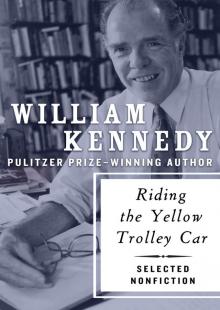 Riding the Yellow Trolley Car
Riding the Yellow Trolley Car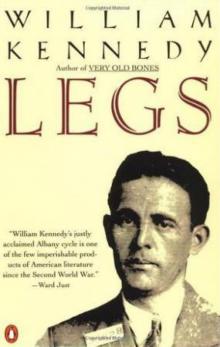 Legs - William Kennedy
Legs - William Kennedy